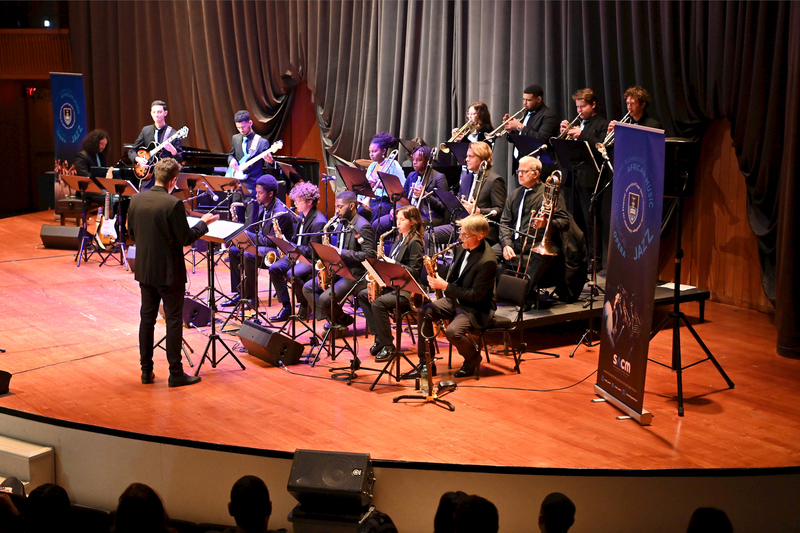UCT Big Band marks Heritage Day with a celebration
26 September 2025 | Story Stephen Langtry. Photos Nasief Manie. Read time 7 min.
The Baxter Concert Hall came alive on Wednesday, 24 September, as the University of Cape Town (UCT) Big Band hosted a Heritage Day celebration. The event formed part of the UCT Jazz Festival, which ran from 23 to 25 September.
The festival brought together students, alumni, faculty, and jazz lovers to honour the university’s rich musical legacy. The Heritage Day celebration moved from classic swing numbers to cutting-edge contemporary compositions, reflecting both South Africa’s local traditions and jazz’s global influences.
A highlight of the night was the presence of Emeritus Associate Professor Mike Campbell, who established the UCT South African College of Music (SACM) jazz programme in 1989. Emeritus Associate Professor Campbell’s pioneering work has helped position UCT as home to the continent’s leading jazz training programme, producing generations of award-winning artists who have made their mark on the international stage.
The festival was also dedicated to Samuel Kruger, affectionately known as “Uncle Sammy”, who has served the SACM for an extraordinary 45 years. In a tribute printed in the festival programme, Campbell described Kruger as “a constant pillar of strength in the college”. Over the decades, Kruger has become much more than a staff member – he is a beloved colleague, mentor and friend to countless musicians who have passed through the SACM’s halls. In his tribute, Professor Andrew Lilley, the current director of the SACM, reflected on Kruger’s enduring contribution before calling Kruger on stage to warm applause.
Timeless and contemporary jazz
Under the direction of Justin Bellairs, a lecturer in Jazz Studies, the UCT Big Band delivered a programme that balanced reverence for tradition with innovation. The ensemble, made up of current students and recent graduates, moved seamlessly from the golden age of swing to contemporary jazz arrangements.
“This year’s Heritage Day celebration stands out because of its rich diversity of artists and the strong focus on South African jazz compositions.”
The evening’s setlist included international classics such as “Big Dipper” by Thad Jones and “Thou Swell” by Lorenz Hart and Richard Rodgers, alongside original South African compositions and arrangements. Highlights included “Sugar Shake” by Cape jazz legend Errol Dyers (arranged by Darryl Andrews), “Bayathetha” by Nomfundo Xaluva-Dyantyis (arranged by Mike Campbell), and “Yehlisan’umoya” by Busi Mhlongo (arranged by Amanda Tiffin).
“This year’s Heritage Day celebration stands out because of its rich diversity of artists and the strong focus on South African jazz compositions,” said SACM concerts coordinator, Fiona Grayer. “The programme featured works by established legends, rising stars, and a variety of instrumental and vocal talents, showcasing the depth and vibrancy of South Africa’s jazz community.”
Grayer highlighted the way the programme created a musical dialogue between homegrown traditions and global sounds. “By placing these works alongside global jazz classics such as “Big Dipper” and Bob Mintzer’s “A Children’s Song”, the programme creates a dialogue between international influences and distinctly South African expressions. This balance not only celebrates our heritage but also positions South African jazz within the broader global context.”
A Festival of Heritage
The UCT Jazz Festival has long been one of the SACM’s flagship events, offering a platform for students, professional staff, and guest performers to collaborate and innovate. This year’s edition spanned three evenings at the Baxter and included a new series of free lunchtime concerts at the WH Bell Music Library.
The Heritage Day concert stood as the centrepiece of the festival. By showcasing both emerging student artists and original compositions rooted in South African musical traditions, the concert embodied the very spirit of Heritage Day: a celebration of diversity, creativity, and shared cultural roots.
“Since I became involved in 2023, I’ve seen the festival grow in both reach and impact, especially within Cape Town’s vibrant jazz community,” Grayer said. “One of our main goals has been to raise the local profile of the festival, making it a key date on the calendar for jazz lovers across the city. In 2025 alone, we’ve successfully hosted three sold-out UCT Big Band concerts, which is a clear sign that our audience is growing and that there’s a real hunger for live jazz experiences in the community.”
Part of that growth, Grayer explained, comes from a deliberate focus on the next generation of jazz lovers. “By offering free tickets to UCT students and school learners, we’re creating opportunities for them to engage with live jazz while they’re still studying, with the hope that they’ll carry that passion forward when they graduate and become lifelong supporters of jazz.”
Another key development has been the festival’s digital reach. “We’ve also made it a priority to invest in the next generation of audiences by elevating our social media presence,” she said. “We’ve been more intentional and creative with our online content, and it’s paid off. People are talking about the festival, sharing posts, and helping to spread the word.”
The audience on the night was notably intergenerational, with veteran jazz enthusiasts sitting alongside students and first-time concertgoers. For Grayer, this is one of the festival’s most exciting aspects. “It’s incredibly rewarding to see these efforts come together,” she said. “The audience growth we’ve seen this year shows that the festival is becoming a central part of Cape Town’s jazz culture, with a strong and expanding community behind it.”
The festival closed the following evening with the Creative Collab Project, an interdisciplinary showcase of new works developed through ensemble rehearsals and composition workshops. Reflecting on the week’s events, Grayer summed up the festival’s impact: “Seeing the confidence, individuality and fearlessness of the next generation of jazz musicians gives me so much hope for the future of jazz in South Africa; and it’s a privilege to play a role in creating platforms like this festival where their talents can shine.”
 This work is licensed under a Creative Commons Attribution-NoDerivatives 4.0 International License.
This work is licensed under a Creative Commons Attribution-NoDerivatives 4.0 International License.
Please view the republishing articles page for more information.


















